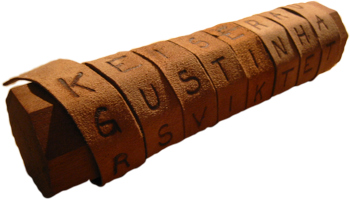
Scytale Encryption
This is the second in a series of missions dedicated to classical cryptography. In this mission we will try to break the Scytale encryption.

Scytale is a transposition cipher. Unlike substitution ciphers, like Atbash or Caesar's cipher, here the letters of the plaintext remain unchanged, but their order is altered.
For example, suppose the message is "let's meet at eleven in the evening" and diameter of the rod allows to write 4 letters in a circle. The scytale with a message written on it would look like this:

After unwinding the strip the message becomes lteeeanvttaesetnmltieehneveg.
If an adversary intercepted a message, they wouldn't be able to read it unless they knew the key to encryption - in this case, the diameter of the cylinder (or, more specifically, number of letters that could be written in a circle around it). However, it could easily be found by trying several rods of different size. Another method (attributed to Aristotle) includes wrapping the parchment with encrypted message around a cone-shaped rod with varying diameter until a fragment of text becomes readable.
In this mission we'll try to break a scytale encryption. You have a cryptogram and a crib - a word that is expected to be in the decrypted message. You need to try all the possible keys until you get a plaintext that contains the crib. If after trying every key you either found no such plaintext, or found more than one possible keys - return None.
There is also one last piece of information: you know that the sender encrypts the messages using the shortest possible strip of parchment, so that there are no empty spaces on it. for example, the message "let's meet at eleven in the evening", encrypted with key 5, will look like this:

Note that the lines have different lengths. The cryptogram will be "leeteetvhntaeeistnenmeivgeln".
Input: ciphertext: str, crib: str
Output: plaintext: str or None
Example:
scytale_decipher('aaaatctwtkdn', 'dawn') == 'attackatdawn'
scytale_decipher('hdoeerlallrdow', 'world') == 'hellodearworld'
scytale_decipher('totetshpmeecisendysescwticsriasraytlaegphet', 'sicret') == None #Crib is not in plaintext
scytale_decipher('aaaatctwtkdn', 'at') == None #More than one possible decryptions
CheckiO Extensions allow you to use local files to solve missions. More info in a blog post.
In order to install CheckiO client you'll need installed Python (version at least 3.8)
Install CheckiO Client first:
pip3 install checkio_client
Configure your tool
checkio --domain=py config --key=
Sync solutions into your local folder
checkio sync
(in beta testing) Launch local server so your browser can use it and sync solution between local file end extension on the fly. (doesn't work for safari)
checkio serv -d
Alternatevly, you can install Chrome extension or FF addon
checkio install-plugin
checkio install-plugin --ff
checkio install-plugin --chromium
Read more here about other functionality that the checkio client provides. Feel free to submit an issue in case of any difficulties.
Welcome to Pair Programming! Engage in real-time collaboration on coding projects by starting a session and sharing the provided unique URL with friends or colleagues. This feature is perfect for joint project development, debugging, or learning new skills together. Simply click 'Start Session' to begin your collaborative coding journey!
You are trying to join a pair programming session that has not started yet.
Please wait for the session creator to join.
It looks like the creator of the pair programming session closed the editor window.
It might happen accidentally, so that you can wait for reconnection.
